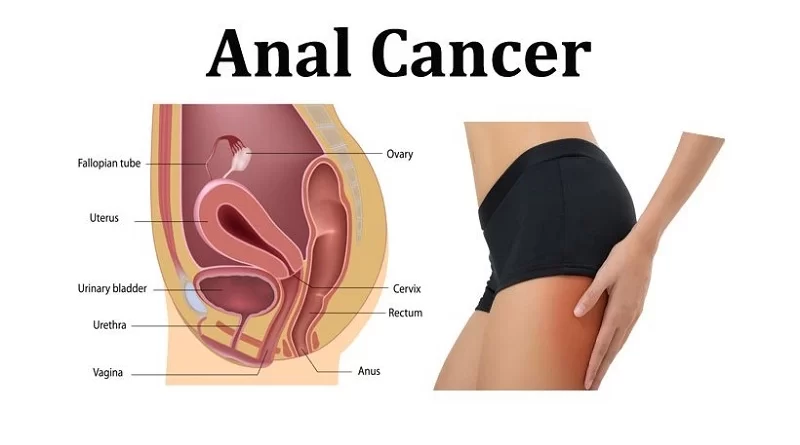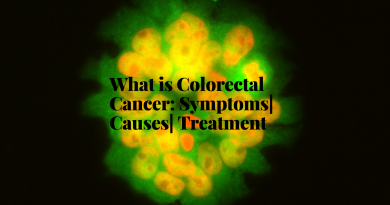Anal Cancer: Types| Causes| Symptoms| Stages| Treatment
Table of Contents
Overview
Anal cancer is an exceptional sort of cancer that happens in the anal canal. The anal canal is a short cylinder toward the end of your rectum through which stool leaves your body.
This malignancy can cause signs and symptoms like rectal bleeding and anal canal. Many people with this are treated with a mix of chemotherapy and radiation. Even though combining anal cancer expands the opportunity of a cure, the combined treatments also increase the risk of side effects.
Types Of Anal Cancer
There are different types of anal cancer, each characterized by the kind of tumor that creates. A tumor is an abnormal growth in the body. Tumors can either be benign or malignant. Malignant or Harmful tumors may spread to different parts of the body after some time, whenever left untreated. Instances of tumors include:
- Benign tumors- These tumors are noncancerous. In the anus, this can incorporate polyps, skin labels, granular cell tumors, and genital warts (condylomas).
- Precancerous conditions- This alludes to benign tumors that may get dangerous over the long haul, which is normal in anal intraepithelial neoplasia (AIN) and anal squamous intraepithelial neoplasia (ASIL).
- Squamous cell carcinoma- Squamous cell malignancy is the most widely recognized sort of anal cancer in the United States. As per the American Cancer Society, it represents 9 out of 10 cases. These malignant tumors in the anus are caused by unusual squamous cells that line most of the anal canal.
- Bowen’s disease- This condition, otherwise called squamous cell carcinoma in situ, is described by abnormal cells on anal surface tissue that haven’t invaded deeper layers.
- Basal cell carcinoma- Basal cell carcinoma is a kind of skin cancer that generally affects when skin is exposed to the sun. Because of this, it’s a very rare form of anal cancer.
- Adenocarcinoma– This is an uncommon type of cancer that arises from the glands surrounding the anus.
The clinical stage of anal cancer is determined during the diagnosis of the disease, which may incorporate a physical exam, imaging tests, and/or biopsy. Surgical or pathological staging (if surgery has been performed) is done by examining tissue.
Causes Of Anal Cancer
It is caused by the development of abnormal cells in the body. These abnormal cells can develop wildly and gather, shaping masses known as tumors. Advanced cancer cells can metastasize, or spread to different parts of the body and interfere with normal functions.
It is believed to be caused in part by the human papillomavirus (HPV), a sexually transmitted infection. It’s predominant in a dominant part of anal cancer cases. Anal cancer may likewise be caused by different other cancer in the body spreading to the butt-centric i. كازينو دوت كوم e. anal canal. This is when cancer grows elsewhere in the body first and afterward metastasizes to the anus.
Symptoms Of Anal Cancer?
The most well-known symptom related to it is Bleeding. Anal itching- tingling can likewise be a manifestation of cancer, numerous individuals at first attribute their bleeding and itching to hemorrhoids. This can delay the diagnosis of anal cancer.
Different and common signs and symptoms of anal cancer may include-
- Pain or pressure in the anal area
- Unusual discharges from the anus
- Lump near the anus
- Change in bowel habits
How Is Anal Cancer Diagnosed?
It might be detected during a routine digital rectal exam or during a minor procedure, such as removal of what is believed to be hemorrhoid. Cancer may likewise be identified with more obtrusive procedures, for example, an anoscopy, proctoscopy, or endorectal ultrasound.
On the off chance that cancer is suspected, a biopsy ought to be done and the specimen examined by a pathologist. Organizing workup may incorporate an abdominal and pelvic CT scan, a pelvic MRI scan to assess the pelvic lymph nodes, a chest x-ray, and liver function studies. PET scans are sometimes performed.
What Are Hazard-Risk Factors For Anal Cancer?
It can occur in any individual, however, a few groups have a higher danger of developing it than others. Risk factors include-
HPV Infection
HPV is a group of viruses that are sexually transmitted and stay in the body after infection. HPV is available in most cases of anal cancer. It was likewise the main source of cervical cancer before the presentation of routine Pap smears.
HIV
HIV puts individuals at a higher danger of anal cancer because of how it compromises your immune system.
Sexual intercourse
Having different sex partners accomplices and having receptive anal sex can increase your risk of getting anal cancer. Not wearing protection, like condoms, additionally expands the danger of anal cancer due to an increased risk of contracting HPV.
Smoking
Smokers are more likely to develop cancer of the anus, even if they quit smoking. So never smoke.
Weak Immune System
A weakened immune system can leave your body defenseless against cancer or another type of viruses and infections too. It is most common in people with HIV and people who take immunosuppressants, or who have had an organ transplant.
Old Age
Most instances of anal cancer happen in individuals beyond 50 years old, as per the Mayo Clinic.
Stages of Anal Cancer
The most normally utilized cancer staging system is the TNM system established by the American Joint Committee on Cancer. The TNM organizing staging systems analyzes three key factors to determine the stage of cancer-
- T (tumor)- This describes the size of the original tumor.
- N (node)- This indicates whether the cancer is present in the lymph nodes.
- M (metastasis)- This refers to whether cancer has spread to other parts of the body.
A number (0-4) or the letter X is assigned to each factor. A higher number shows expanding severity. For example, a T1 score demonstrates a smaller tumor than a T2 score. The letter X means the information could not be assessed.
When the T, N, and M scores have been assigned, one of the accompanying anal cancer stages is assigned from Stage 0 to 4 of Anal Cancer-
- Stage 0- Cancer has not grown beyond the top layer of anal tissue and has not spread. Likewise called carcinoma in situ or Bowen’s illness.
- Stage 1- Cancer has spread beyond the top layer of anal tissue, yet it has not spread to close nodes or distant sites. The tumor is less than 2 cm.
- Stage 2- The tumor is more prominent than 2 cm however has not spread to close organs, lymph nodes, or distant sites.
- Stage 3- There are two subcategories of stage 3 anal cancer: 3A and 3B. 3A and 3B. The categories differ by the extent to which cancer has spread.
Stage 3A anal cancer might be staged in two unique manners-
The cancer is any size yet has not d into grown by nearby organs. The malignancy has spread to the lymph nodes around the rectum. The malignancy has not spread to distant sites, OR
Cancer has spread to close organs, like the vagina or bladder. The malignancy has not spread to close lymph nodes. Cancer has not spread to distant sites.
Stage 3B malignant growth may likewise be staged in two distinct manners-
Cancer has spread to close organs, like the vagina or bladder. The malignancy has spread to the lymph nodes around the rectum. Cancer has not spread to distant sites of the body, OR
The cancer is any size and might or might not have grown into nearby organs. Cancer has spread to the lymph nodes in the groin or pelvis and may or may not have spread to lymph nodes around the rectum. cancer has not spread to distant sites.
- Stage 4- Stage 4 is the most advanced and dangerous stage of anal cancer. Cancer is any size and could conceivably have or haven’t spread to close organs, like the vagina or bladder. Cancer may or may not have spread to nearby lymph nodes. Cancer has spread to distant organs and tissues.
Prevention From Anal Cancer
There is no sure way to prevent anal cancer but you can reduce your risk of anal cancer by following these steps-
Practice more secure sex
Practicing safe sex may help prevent HPV and HIV, the two most dangerous sexually transmitted viruses that may increase your risk of anal cancer. On the off chance that you decide to have anal sex, use condoms.
Get vaccinated against HPV
A vaccine to secure against HPV infection is accessible. It is suggested for adolescents, including the two young men and young ladies, yet might be given to adults, as well.
Quit smoking
Smoking expands your danger of cancer. Try not to begin smoking. Stop if you right now smoke.
How Is Anal Cancer Treated?
There is no cure for cancer, yet numerous individuals who are diagnosed to have it proceed to live healthy and fulfilling lives. Contingent upon your age and the stage of cancer, there are a 4 kinds of treatment choices for anal cancer that doctors may offer you, either by themselves or in combination-
1- Chemotherapy
Chemotherapy can be utilized to kill cancer cells and prevent them from developing. It can be injected into the body or taken orally. Pain relievers may also be used in chemotherapy intermittently to control anal cancer symptoms. لعبة روليت مباشر
2- Surgery
Local resection surgery is often used to remove a tumor in the anus along with some healthy tissue around it. This method is generally normal with individuals whose cancer is in the lower part of the anus and hasn’t spread to too many nearby structures. It is best performed and works well in cancers that are early stage and for tumors that are small.
3- Abdominoperineal (AP) resection is a more invasive surgery
This surgery is reserved for individuals who have not responded well to other treatments or who are late-stage. It includes making an incision in the abdomen to remove the anus, rectum, or parts of the sigmoid colon. العب بلاك جاك اون لاين
Because this surgery removes the whole lower portion of the GI tract, the surgeons create an ostomy, which is a connection from the GI tract to the skin. A patient who gets an ostomy will need to collect their stool in an ostomy bag.
4- Alternative therapy
Radiation therapies are common for many forms of cancer, including cancer of the anus. X-rays and other radiations are utilized to kill cancer cells in the body, though they may also kill nearby healthy tissue. This treatment is non-invasive and is usually combined with other cancer treatments.
Conclusion
Anal cancer is very uncommon and dangerous kind of cancer. Anal is the small tube through which your body leaves out stool. there may be many reasons for developing anal cancer. However, in most cases, it happens due to genetic mutations where the cells grow abnormally leading to cancer. Apart from this, having multiple sex partners or practicing anal sex may increase the chances of this. Consuming any immunosuppressant or having an HPV infection also helps in the growth of cancer. To save yourself practice safe sex and avoid smoking as much as you can. In case of HPV infection, get vaccinated.

